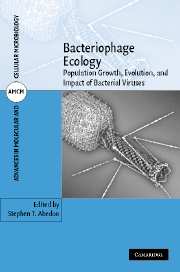Book contents
- Frontmatter
- Contents
- About the cover
- List of contributors
- Foreword by Bruce R. Levin
- Preface
- 1 Phages, ecology, evolution
- Part I Phage ecology
- 2 Bacteriophages: models for exploring basic principles of ecology
- 3 Phage population growth: constraints, games, adaptation
- 4 Impact of spatial structure on phage population growth
- 5 Contribution of lysogeny, pseudolysogeny, and starvation to phage ecology
- Part II Phage evolutionary biology
- Part III Phage ecology in environments
- Part IV Modeling phage ecology
- Index
- Plate section
2 - Bacteriophages: models for exploring basic principles of ecology
from Part I - Phage ecology
Published online by Cambridge University Press: 29 September 2009
- Frontmatter
- Contents
- About the cover
- List of contributors
- Foreword by Bruce R. Levin
- Preface
- 1 Phages, ecology, evolution
- Part I Phage ecology
- 2 Bacteriophages: models for exploring basic principles of ecology
- 3 Phage population growth: constraints, games, adaptation
- 4 Impact of spatial structure on phage population growth
- 5 Contribution of lysogeny, pseudolysogeny, and starvation to phage ecology
- Part II Phage evolutionary biology
- Part III Phage ecology in environments
- Part IV Modeling phage ecology
- Index
- Plate section
Summary
INTRODUCTION
A virus depends intimately upon its host in order to reproduce, which makes the host organism a crucial part of the virus's environment. This basic facet of viral existence means that ecology, the scientific field focusing on how organisms interact with each other and their environment, is particularly relevant to the study of viruses. In this chapter we explore some of the ways in which the principles of ecology apply to viruses that infect bacteria — the bacteriophages (or “phages” for short). In turn, we also discuss how the study of phages and their bacterial hosts has contributed to different subfields of ecology.
Due to their ease of manipulation, large population sizes, short generation times, and wealth of physiological and genetic characterization, laboratory communities of microbial organisms have been popular experimental tools for testing ecological theory (Drake et al., 1996; Jessup et al., 2004). Building upon this foundation of knowledge, the ecological experimentalist can explore whether mechanistic understanding at the organismal level informs an understanding of patterns at the community level (Bohannan and Lenski, 2000a). Further, the initial composition of microbial consortia can be controlled, and thus researchers are able to probe the effects of different community structures on ecological phenomena, such as stability, diversity, and resilience to invasion.
- Type
- Chapter
- Information
- Bacteriophage EcologyPopulation Growth, Evolution, and Impact of Bacterial Viruses, pp. 31 - 63Publisher: Cambridge University PressPrint publication year: 2008
- 9
- Cited by



